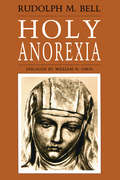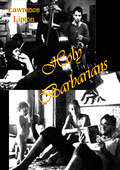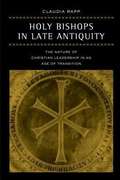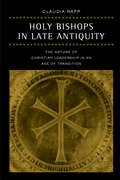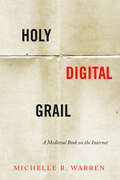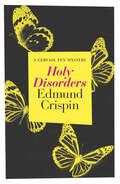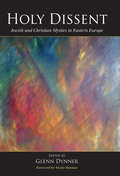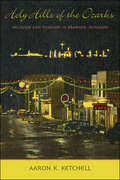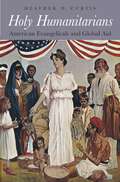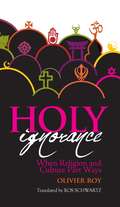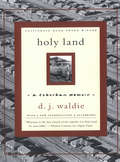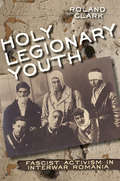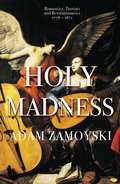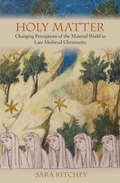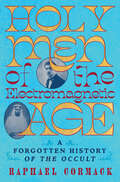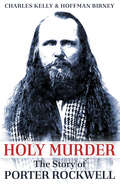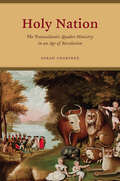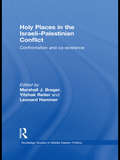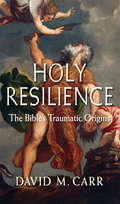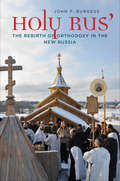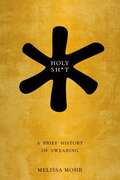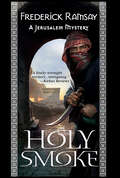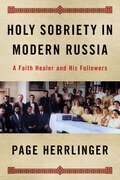- Table View
- List View
Holy Anorexia
by Rudolph M. Bell&“A brilliant, disturbing study of anorexic behavior amongst medieval Italian female saints . . . original, controversial, superbly executed.&” —Kirkus Reviews Is there a resemblance between the contemporary anorexic teenager counting every calorie in her single-minded pursuit of thinness, and an ascetic medieval saint examining her every desire? Rudolph M. Bell suggests that the answer is yes. &“Everyone interested in anorexia nervosa . . . should skim this book or study it. It will make you realize how dependent upon culture the definition of disease is. I will never look at an anorexic patient in the same way again.&” —Howard Spiro, M.D., Gastroenterology &“[This] book is a first-class social history and is well-documented both in its historical and scientific portions.&” —Vern L. Bullough, American Historical Review &“A significant contribution to revisionist history, which re-examines events in light of feminist thought . . . Bell is particularly skillful in describing behavior within its time and culture, which would be bizarre by today&’s norms, without reducing it to the pathological.&” —Mary Lassance Parthun, Toronto Globe and Mail &“Bell is both enlightened and convincing. His book is impressively researched, easy to read, and utterly fascinating.&” —Sheila MacLeod, New Statesman
Holy Barbarians
by Lawrence LiptonMr. Lipton's book is the first complete and unbiased survey of the beat generation and its role in our society. Here are the intimate facts about these people and their attitudes toward sex, dope, jazz, art, religion, parents, landlords, employers, politicians, draft boards, the law and, most important, toward the "square". The author presents a picture of their way of life, their individual backgrounds, the language they have appropriated, in terms made clear for the first time to those of us who have been confused and puzzled about them. He also provides a balanced discussion of their literature, art and music, of what they produce and fail to produce in the arts they practice.--Print Ed.
Holy Bishops in Late Antiquity: The Nature of Christian Leadership in an Age of Transition
by Claudia RappThis book offers a new interpretation of the nature of bishops' power in late antiquity, arguing that bishops had a pragmatic approach to power much like that of secular rulers.
Holy Bishops in Late Antiquity: The Nature of Christian Leadership in an Age of Transition (Transformation of the Classical Heritage #37)
by Claudia RappBetween 300 and 600, Christianity experienced a momentous change from persecuted cult to state religion. One of the consequences of this shift was the evolution of the role of the bishop--as the highest Church official in his city--from model Christian to model citizen. Claudia Rapp's exceptionally learned, innovative, and groundbreaking work traces this transition with a twofold aim: to deemphasize the reign of the emperor Constantine, which has traditionally been regarded as a watershed in the development of the Church as an institution, and to bring to the fore the continued importance of the religious underpinnings of the bishop's role as civic leader. Rapp rejects Max Weber's categories of "charismatic" versus "institutional" authority that have traditionally been used to distinguish the nature of episcopal authority from that of the ascetic and holy man. Instead she proposes a model of spiritual authority, ascetic authority and pragmatic authority, in which a bishop's visible asceticism is taken as evidence of his spiritual powers and at the same time provides the justification for his public role. In clear and graceful prose, Rapp provides a wholly fresh analysis of the changing dynamics of social mobility as played out in episcopal appointments.
Holy Digital Grail: A Medieval Book on the Internet (Stanford Text Technologies)
by Michelle R. WarrenMedieval books that survive today have been through a lot: singed by fire, mottled by mold, eaten by insects, annotated by readers, cut into fragments, or damaged through well-intentioned preservation efforts. In this book, Michelle Warren tells the story of one such manuscript—an Arthurian romance with textual origins in twelfth-century England now diffused across the twenty-first century internet. This trajectory has been propelled by a succession of technologies—from paper manufacture to printing to computers. Together, they have made literary history itself a cultural technology indebted to colonial capitalism. Bringing to bear media theory, medieval literary studies, and book history, Warren shows how digital infrastructures change texts and books, even very old ones. In the process, she uncovers a practice of "tech medievalism" that weaves through the history of computing since the mid-twentieth century; metaphors indebted to King Arthur and the Holy Grail are integral to some of the technologies that now sustain medieval books on the internet. This infrastructural approach to book history illuminates how the meaning of literature is made by many people besides canonical authors: translators, scribes, patrons, readers, collectors, librarians, cataloguers, editors, photographers, software programmers, and many more. Situated at the intersections of the digital humanities, library sciences, literary history, and book history, Holy Digital Grail offers new ways to conceptualize authorship, canon formation, and the definition of a "book."
Holy Disorders (The Gervase Fen Mysteries)
by Edmund CrispinThis 1945 classic British mystery from &“a master of the whodunnit . . . combines a flawless plot, witty dialogue and a touch of surreal hilarity&” (The New York Times Book Review). On holiday in the town of Tolnbridge with his butterfly net in hand, Prof. Gervase Fen, Oxford don of English Literature, is all set for a good frolic when he learns that the cathedral organist has been murdered. With Scotland Yard unable to make sense of the crime, Fen stands ready to step in. Whether he&’s chasing butterflies or catching criminals, it&’s all the same to this amateur sleuth with a penchant for literary allusions and an uncanny knack for solving the unsolvable: like why a small-town church musician would be mixed up with a local coven of witches—or a spy ring of Nazi sympathizers? Finding the answers provides endless amusement for Fen—and for readers as well—in this golden age English detective novel from Edmund Crispin, &“an absolute must for devotees of cultivated crime fiction.&” —Kirkus Reviews Praise for the mysteries of Edmund Crispin &“A marvellous comic sense.&” —P. D. James, New York Times–bestselling author of the Inspector Adam Dalgliesh series &“Master of fast-paced, tongue-in-cheek mystery novels, a blend of John Dickson Carr, Michael Innes, M.R. James, and the Marx Brothers.&” —Anthony Boucher, author of the Fergus O&’Breen series &“One of the most literate mystery writers of the twentieth century.&” —The Boston Globe &“Beneath a formidable exterior he had unsuspected depths of frivolity.&” —Philip Larkin, author of A Girl in Winter &“One of the last exponents of the classical English detective story.&” —The Times (London)
Holy Dissent: Jewish and Christian Mystics in Eastern Europe
by Glenn Dynner Moshe RosmanBrings together highly regarded scholars of Jewish and Christian mysticism in Eastern Europe to analyze the overlap of mysticism in the two religions.
Holy Fools
by Joanne HarrisJoanne Harris, bestselling author of Chocolat, presents her most accomplished novel yet -- an intoxicating concoction that blends theology and reason, deception and masquerade, with a dash of whimsical humor and a soupçon of sensuality. Britanny, 1610. Juliette, a one-time actress and rope dancer, is forced to seek refuge among the sisters of the abbey of Sainte Marie-de-la-mer. Reinventing herself as Soeur Auguste, Juliette makes a new life for herself and her young daughter, Fleur. But when the kindly abbess dies, Juliette's comfortable existence begins to unravel. The abbey's new leader is the daughter of a corrupt noble family, and she arrives with a ghost from Juliette's past -- Guy LeMerle, a man she has every reason to fear and hate. This P.S. edition features an extra 16 pages of insights into the book, including author interviews, recommended reading, and more.
Holy Hills of the Ozarks: Religion and Tourism in Branson, Missouri (Lived Religions)
by Aaron K. Ketchell“Confronts readers with the implications of a popular tourist destination founded on the values and sentiments of American evangelical Protestantism.” —Thomas S. Bremer, Journal of the American Academy of ReligionOver the past century, Branson, Missouri, has attracted tens of millions of tourists. Nestled in the heart of the Ozark Mountains, it offers a rare and refreshing combination of natural beauty and family-friendly recreation—from scenic lakes and rolling hills to theme parks and variety shows. It has boasted of big-name celebrities, like Wayne Newton, Andy Williams, and Petula Clark, as well as family entertainers like Mickey Gilley, the Shanghai Magic Troupe, Jim Stafford, and Yakov Smirnoff.But there is more to Branson’s fame than just recreation. As Aaron K. Ketchell discovers, a popular variant of Christianity underscores all Branson’s tourist attractions and fortifies every consumer success. In this lively and engaging study, Ketchell explores Branson’s unique blend of religion and recreation. He explains how the city became a mecca of conservative Christianity—a place for a “spiritual vacation”—and how, through conscious effort, its residents and businesses continuously reinforce its inextricable connection with the divine.Ketchell combines the study of lived religion, popular culture, evangelicalism, and contemporary American history to present an accurate and honest account of a distinctly American phenomenon.“As Ketchell brilliantly argues, Branson entrepreneurs wove Christian sentiment ‘into a fabric of nostalgia, premodern longing, and whitewashed rusticity.’” —Matthew Avery Sutton, The Christian Century“At a time when Jim Wallis and other observers have forecast the end of the prominence of right-wing-religion on the U.S. political stage, this book will cause many readers to question that prediction.” —David Stricklin, The Journal of Southern History
Holy Humanitarians: American Evangelicals and Global Aid
by Heather D. CurtisOn May 10, 1900, an enthusiastic Brooklyn crowd bid farewell to the Quito. The ship sailed for famine-stricken Bombay, carrying both tangible relief—thousands of tons of corn and seeds—and “a tender message of love and sympathy from God’s children on this side of the globe to those on the other.” The Quito may never have gotten under way without support from the era’s most influential religious newspaper, the Christian Herald, which urged its American readers to alleviate poverty and suffering abroad and at home. In Holy Humanitarians, Heather D. Curtis argues that evangelical media campaigns transformed how Americans responded to domestic crises and foreign disasters during a pivotal period for the nation. Through graphic reporting and the emerging medium of photography, evangelical publishers fostered a tremendously popular movement of faith-based aid that rivaled the achievements of competing agencies like the American Red Cross. By maintaining that the United States was divinely ordained to help the world’s oppressed and needy, the Christian Herald linked humanitarian assistance with American nationalism at a time when the country was stepping onto the global stage. Social reform, missionary activity, disaster relief, and economic and military expansion could all be understood as integral features of Christian charity. Drawing on rigorous archival research, Curtis lays bare the theological motivations, social forces, cultural assumptions, business calculations, and political dynamics that shaped America’s ambivalent embrace of evangelical philanthropy. In the process she uncovers the seeds of today’s heated debates over the politics of poverty relief and international aid.
Holy Ignorance: When Religion and Culture Part Ways (Columbia/Hurst)
by Olivier RoyOlivier Roy, world renowned authority on Islam and politics, finds in the modern disconnection between faith communities and sociocultural identities a fertile space for fundamentalism to grow. Instead of freeing the world from religion, secularization has encouraged a kind of holy ignorance to take root, an anti-intellectualism that promises immediate, emotional access to the sacred and positions itself in direct opposition to contemporary pagan culture. The secularization of society was supposed to free people from religion, yet individuals are converting en masse to fundamentalist faiths, such as Protestant evangelicalism, Islamic Salafism, and Haredi Judaism. These religions either reconnect adherents to their culture through casual referents, like halal fast food, or "deculturate" through "purification" rituals, such as speaking in tongues, a practice that allows believers to utter a language entirely their own. Instead of a return to traditional religious worship, we are now witnessing the individualization of faith and the disassociation of faith communities from ethnic and national identities. This has placed culturally integrated religions, such as Catholicism and eastern orthodox Christianity, on the defensive, and presents new challenges to state and society. Roy explores the options available to powers that hope to integrate or control these groups and whether marginalization or homogenization will further divide believers from their culture.
Holy Imagination: A Literary and Theological Introduction to the Whole Bible
by Judy Fentress-WilliamsThe many voices in scripture form a dialogue with readers, which produce theological truths that are larger than the individual parts. This introduction is informed by both literary theory and theology. It groups sections of the whole Bible together by genre. Each section identifies and describes the genre (such as historiography, poetry, prophecy, gospel, letter, apocalypse), and then moves into a discussion about the literary characteristics and theological insights.The words of scripture not only come a long way to find us but like a poem must be read with attention. Poetry doesn’t yield meaning easily, and it doesn’t promise to make sense. We know to look past the words on the page and find the images, tropes, sounds, and metaphors that are meaning-full. This type of writing invites, rather demands, the imagination. We must accept that we will only get so close, but that this is close enough. Our imagination spans the gaps left by sparse language and incomplete narratives. We return again and again, with more information and perhaps more experiences. The words are the same, but we are not; and for that reason there are always new discoveries.“At last, an introduction that students will enjoy reading, because it is at once engaging, informative, and eye-opening, as well as completely lucid. Fentress Williams shows how many books of the Bible reflect the experience of marginalized persons and communities in precarious situations, and therefore how they speak in ways both realistic and encouraging to contemporary readers. Do your students and yourself a favor: adopt this text and get ready for serious conversation about ancient texts that never go out of date.”– Ellen F. Davis, Amos Ragan Kearns Distinguished Professor of Bible and Practical Theology, Duke Divinity School
Holy Land: A Suburban Memoir
by D. J. Waldie"Infinitely moving and powerful, just dead-on right, and absolutely original."--Joan Didion Since its publication in 1996, Holy Land has become an American classic. In "quick, translucent prose" (Michiko Kakutani, New York Times) that is at once lyrical and unsentimental, D. J. Waldie recounts growing up in Lakewood, California, a prototypical post-World War II suburb. Laid out in 316 sections as carefully measured as a grid of tract houses, Holy Land is by turns touching, eerie, funny, and encyclopedic in its handling of what was gained and lost when thousands of blue-collar families were thrown together in the suburbs of the 1950s. An intensely realized and wholly original memoir about the way in which a place can shape a life, Holy Land; is ultimately about the resonance of choices--how wide a street should be, what to name a park--and the hopes that are realized in the habits of everyday life. 20 illustrations and a new introduction for this paperback edition.
Holy Legionary Youth: Fascist Activism in Interwar Romania
by Roland ClarkFounded in 1927, Romania’s Legion of the Archangel Michael was one of Europe’s largest and longest-lived fascist social movements. In Holy Legionary Youth, Roland Clark draws on oral histories, memoirs, and substantial research in the archives of the Romanian secret police to provide the most comprehensive account of the Legion in English to date. Clark approaches Romanian fascism by asking what membership in the Legion meant to young Romanian men and women. Viewing fascism “from below,” as a social category that had practical consequences for those who embraced it, he shows how the personal significance of fascism emerged out of Legionaries’ interactions with each other, the state, other political parties, families and friends, and fascist groups abroad. Official repression, fascist spectacle, and the frequency and nature of legionary activities changed a person’s everyday activities and relationships in profound ways. Clark’s sweeping history traces fascist organizing in interwar Romania to nineteenth-century grassroots nationalist movements that demanded political independence from the Austro-Hungarian Empire. It also shows how closely the movement was associated with the Romanian Orthodox Church and how the uniforms, marches, and rituals were inspired by the muscular, martial aesthetic of fascism elsewhere in Europe. Although antisemitism was a key feature of official fascist ideology, state violence against Legionaries rather than the extensive fascist violence against Jews had a far greater impact on how Romanians viewed the movement and their role in it. Approaching fascism in interwar Romania as an everyday practice, Holy Legionary Youth offers a new perspective on European fascism, highlighting how ordinary people “performed” fascism by working together to promote a unique and totalizing social identity.
Holy Madness: Romantics, Patriots And Revolutionaries 1776-1871
by Adam ZamoyskiFrom America's fight for independence to the Paris Commune - an exotic collection of fanatics, adventurers, poets and thinkers are brought vividly to life.Holy Madness probes into the psyche that was responsible for so many of the founding events of our modern world, and into the instincts that inspired its most generous and most murderous impulses. It explains how the Enlightenment dislodged Christianity from its central position in the life of European societies and how man's quest for ecstasy and transcendence flooded into areas such as the arts, spawning the Romantic movement. This dramatic journey which begins in America in 1776 and goes right up to the last agony of the Paris Commune in 1871, takes in the French revolution, the Irish rebellion, the Polish risings, the war of Greek liberation, the Russian insurrection, the Hungarian struggles for freedom, the liberation of South America, and the Italian Risorgimento.'An ambitious and in many ways brilliant book' Hilary Mantel
Holy Matter: Changing Perceptions of the Material World in Late Medieval Christianity
by Sara RitcheyA magnificent proliferation of new Christ-centered devotional practices—including affective meditation, imitative suffering, crusade, Eucharistic cults and miracles, passion drama, and liturgical performance—reveals profound changes in the Western Christian temperament of the twelfth century and beyond. This change has often been attributed by scholars to an increasing emphasis on God’s embodiment in the incarnation and crucifixion of Christ. In Holy Matter, Sara Ritchey offers a fresh narrative explaining theological and devotional change by journeying beyond the human body to ask how religious men and women understood the effects of God’s incarnation on the natural, material world. She finds a remarkable willingness on the part of medieval Christians to embrace the material world—its trees, flowers, vines, its worms and wolves—as a locus for divine encounter.Early signs that perceptions of the material world were shifting can be seen in reformed communities of religious women in the twelfth-century Rhineland. Here Ritchey finds that, in response to the constraints of gendered regulations and spiritual ideals, women created new identities as virgins who, like the mother of Christ, impelled the world’s re-creation—their notion of the world’s re-creation held that God created the world a second time when Christ was born. In this second act of creation God was seen to be present in the physical world, thus making matter holy. Ritchey then traces the diffusion of this new religious doctrine beyond the Rhineland, showing the profound impact it had on both women and men in professed religious life, especially Franciscans in Italy and Carthusians in England. Drawing on a wide range of sources including art, liturgy, prayer, poetry, meditative guides, and treatises of spiritual instruction, Holy Matter reveals an important transformation in late medieval devotional practice, a shift from metaphor to material, from gazing on images of a God made visible in the splendor of natural beauty to looking at the natural world itself, and finding there God’s presence and promise of salvation.
Holy Men of the Electromagnetic Age: A Forgotten History of the Occult
by Raphael CormackAn international history of the uncanny in the 1920s and 1930s. The interwar period was a golden age for the occult. Spiritualists, clairvoyants, fakirs, Theosophists, mind readers, and Jinn summoners all set out to assure the masses that just as newly discovered invisible forces of electricity and magnetism determined the world of science, unseen powers commanded an unknown realm of human potential Drawing on untapped sources in Arabic in addition to European ones, Raphael Cormack follows two of the most unusual and charismatic figures of this age: Tahra Bey, who took 1920s Paris by storm in the role of a missionary from the mystical East; and Dr. Dahesh, who transformed Western science to create a panreligious faith of his own in Lebanon. Traveling between Paris, New York, and Beirut while guiding esoteric apprenticeships among miracle-working mystics in Egypt and Istanbul, these men reflected the desires and anxieties of a troubled age. As Cormack demonstrates, these forgotten holy men, who embodied the allure of the unexplained in a world of dramatic change, intuitively speak to our unsettling world today
Holy Murder: The Story of Porter Rockwell
by Charles Kelly Birney HoffmanHoly Murder, first published in 1934, is a fascinating, controversial look at the “Avenging Angel” of the Mormon Church, Porter Rockwell. The authors trace the violent history of the Mormon Church beginning with its origins in New York and Illinois, to the flight of its members and their settlement near the Great Salt Lake. Citing numerous sources and interviewing witnesses and descendants, the exploits of Rockwell are detailed to form a picture of a man on the one hand kind to children and his friends, while on the other capable of the most grisly murders of perceived enemies of the church. Although open to criticism for its anti-Mormon bias, attempting to accurately portray Rockwell is difficult as he did not keep a personal diary and many of his activities were shrouded in secrecy. Included are 12 pages of illustrations.
Holy Nation: The Transatlantic Quaker Ministry in an Age of Revolution (American Beginnings, 1500–1900)
by Sarah CrabtreeEarly American Quakers have long been perceived as retiring separatists, but in Holy Nation Sarah Crabtree transforms our historical understanding of the sect by drawing on the sermons, diaries, and correspondence of Quakers themselves. Situating Quakerism within the larger intellectual and religious undercurrents of the Atlantic World, Crabtree shows how Quakers forged a paradoxical sense of their place in the world as militant warriors fighting for peace. She argues that during the turbulent Age of Revolution and Reaction, the Religious Society of Friends forged a “holy nation,” a transnational community of like-minded believers committed first and foremost to divine law and to one another. Declaring themselves citizens of their own nation served to underscore the decidedly unholy nature of the nation-state, worldly governments, and profane laws. As a result, campaigns of persecution against the Friends escalated as those in power moved to declare Quakers aliens and traitors to their home countries.Holy Nation convincingly shows that ideals and actions were inseparable for the Society of Friends, yielding an account of Quakerism that is simultaneously a history of the faith and its adherents and a history of its confrontations with the wider world. Ultimately, Crabtree argues, the conflicts experienced between obligations of church and state that Quakers faced can illuminate similar contemporary struggles.
Holy Places in the Israeli-Palestinian Conflict: Confrontation and Co-existence (Routledge Studies in Middle Eastern Politics)
by Yitzhak Reiter Marshall J. Breger Leonard HammerThis book addresses the major generators of conflict and toleration at shared holy places in Palestine and Israel. Examining the religious, political and legal issues, the authors show how the holy sites have been a focus of both conflict and cooperation between different communities. Bringing together the views of a diverse group of experts on the region, Holy Places in the Israeli-Palestinian Conflict provides a new and multifaceted approach to holy places, giving an in-depth analysis of relevant issues. Themes covered include legal regulation of holy places; nationalization and reproduction of holy space; sharing and contesting holy places; identity politics; and popular legends of holy sites. Chapters cover in detail how recognition and authorization of a new site come about; the influence of religious belief versus political ideology on the designation of holy places; the centrality of such areas to the surrounding political developments; and how historical background and culture affect the perception of a holy site and relations between conflicting groups. This new approach to the study of holy places and the Israeli-Palestinian conflict has great significance for a variety of disciplines, and will be of great interest in the fields of law, politics, religious studies, anthropology and sociology.
Holy Resilience
by David M. CarrHuman trauma gave birth to the Bible, suggests eminent religious scholar David Carr. The Bible’s ability to speak to suffering is a major reason why the sacred texts of Judaism and Christianity have retained their relevance for thousands of years. In his fascinating and provocative reinterpretation of the Bible’s origins, the author tells the story of how the Jewish people and Christian community had to adapt to survive multiple catastrophes and how their holy scriptures both reflected and reinforced each religion’s resilient nature. Carr’s thought-provoking analysis demonstrates how many of the central tenets of biblical religion, including monotheism and the idea of suffering as God’s retribution, are factors that provided Judaism and Christianity with the strength and flexibility to endure in the face of disaster. In addition, the author explains how the Jewish Bible was deeply shaped by the Jewish exile in Babylon, an event that it rarely describes, and how the Christian Bible was likewise shaped by the unspeakable shame of having a crucified savior.
Holy Rus': The Rebirth of Orthodoxy in the New Russia
by John P. BurgessA fascinating, vivid, and on-the-ground account of Russian Orthodoxy's resurgence A bold experiment is taking place in Russia. After a century of being scarred by militant, atheistic communism, the Orthodox Church has become Russia's largest and most significant nongovernmental organization. As it has returned to life, it has pursued a vision of reclaiming Holy Rus': that historical yet mythical homeland of the eastern Slavic peoples; a foretaste of the perfect justice, peace, harmony, and beauty for which religious believers long; and the glimpse of heaven on earth that persuaded Prince Vladimir to accept Orthodox baptism in Crimea in A. D. 988. Through groundbreaking initiatives in religious education, social ministry, historical commemoration, and parish life, the Orthodox Church is seeking to shape a new, post-communist national identity for Russia. In this eye-opening and evocative book, John Burgess examines Russian Orthodoxy's resurgence from a grassroots level, providing Western readers with an enlightening, inside look at the new Russia.
Holy Sh*t: A Brief History of Swearing
by Melissa MohrDetermining what is obscene is a timeless preoccupation, nearly as timeless as the search for words that adequately express a relationship with the divine. As Melissa Mohr shows in this imaginative and illuminating tour through linguistic history, those preoccupations are not separate. "Swearing" is what we do when we forge a bond with a higher authority, as when we tell the truth and nothing but the truth; it is also what we do to break that bond. In both cases, certain words are endowed with the power to shock or to awe. Obscenities tend toward the earthy and generally remind us that we have bodies. Oaths are lifted to heaven and serve to remind us that we have souls. Holy Sh*t brilliantly and entertainingly investigates these two kinds of swearing--obscenities and oaths--from ancient Rome and the Bible to the present, uncovering the history of sacred and profane language in English through the ages. It is a journey with a number of surprises. Obscenities in ancient Rome were remarkably similar to our own; George Carlin would have felt completely at home. With the rise of the Church came a new sense of how language should be used, or not--and the difference was often a matter of life and death. Holy Sh*t tracks the advancement of civility and corresponding censorship of language in the eighteenth century; considers the rise of racial slurs after World War II; examines the physiological effects of swearing (increased heart rate and greater pain tolerance); and answers a question that preoccupies the FCC, the U.S. Senate, and anyone who has lately visited a junior high school: are we swearing more now than people did in the past? A gem of lexicography and cultural history, Holy Sh*t is a serious exploration of linguistic totem and taboo. It charts the way swearing has changed over the centuries, and considers the cultural concerns that gave way to those changes. By looking at the words that have expressed our deepest emotions, high and low, Holy Sh*t reveals the shifting relationship between the divine and the dirty. MELISSA MOHR has recently been dividing her time between writing this book about swearing, and hiding it from her kids. She received a Ph.D. in English literature from Stanford University, specializing in Medieval and Renaissance literature. She lives in Somerville, Massachusetts.
Holy Smoke: A Jerusalem Mystery (large Print 16pt) (Jerusalem Mysteries #2)
by Frederick RamsayThe year is 29 C.E., and Jerusalem chafes under the Roman Empire's oppressive rule. A badly scorched body is found behind the Veil of the Holy of Holies—the Temple's inner sanctum, the most sacred space on earth for the Jews. No one except the high priest may enter this place and he only on the Day of Atonement. This is no casual violation, and the authorities are in an uproar.Gamaliel, the rabban of the Sanhedrin, is the ranking rabbi in all of Judea. Now he must solve this delicate mystery while dark agents with unholy interests plot to seize control of much of the trade in certain highly profitable imports. As the tangled web of intrigue and murder is slowly unraveled, Yeshua, the radical rabbi from Galilee, continues to annoy the high priest, and holy smoke from the sacrifices rises from the Temple.
Holy Sobriety in Modern Russia: A Faith Healer and His Followers (NIU Series in Slavic, East European, and Eurasian Studies)
by Page HerrlingerDrawing on multiple archives and primary sources, including secret police files and samizdat, Holy Sobriety in Modern Russia reconstructs the history of a spiritual movement that survived persecution by the Orthodox church and decades of official atheism, and still exists today. Since 1894, tens of thousands of Russians have found hope and faith through the teachings and prayers of the charismatic lay preacher and healer, Brother Ioann Churikov (1861–1933). Inspired by Churikov's deep piety, "miraculous" healing ability, and scripture-based philosophy known as holy sobriety, the "trezvenniki"—or "sober ones"—reclaimed their lives from the effects of alcoholism, unemployment, domestic abuse, and illness. Page Herrlinger examines the lived religious experience and official repression of this primarily working-class community over the span of Russia's tumultuous twentieth century, crossing over—and challenging—the traditional divide between religious and secular studies of Russia and the Soviet Union, and highlighting previously unseen patterns of change and continuity between Russia's tsarist and socialist pasts. This grass-roots faith community makes an ideal case study through which to explore patterns of spiritual searching and religious toleration under both tsarist and Soviet rule, providing a deeper context for today's discussions about the relationship between Russian Orthodoxy and national identity. Holy Sobriety in Modern Russia is a story of resilience, reinvention, and resistance. Herrlinger's analysis seeks to understand these unorthodox believers as active agents exercising their perceived right to live according to their beliefs, both as individuals and as a community.
